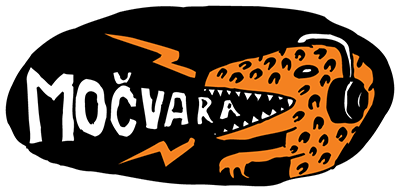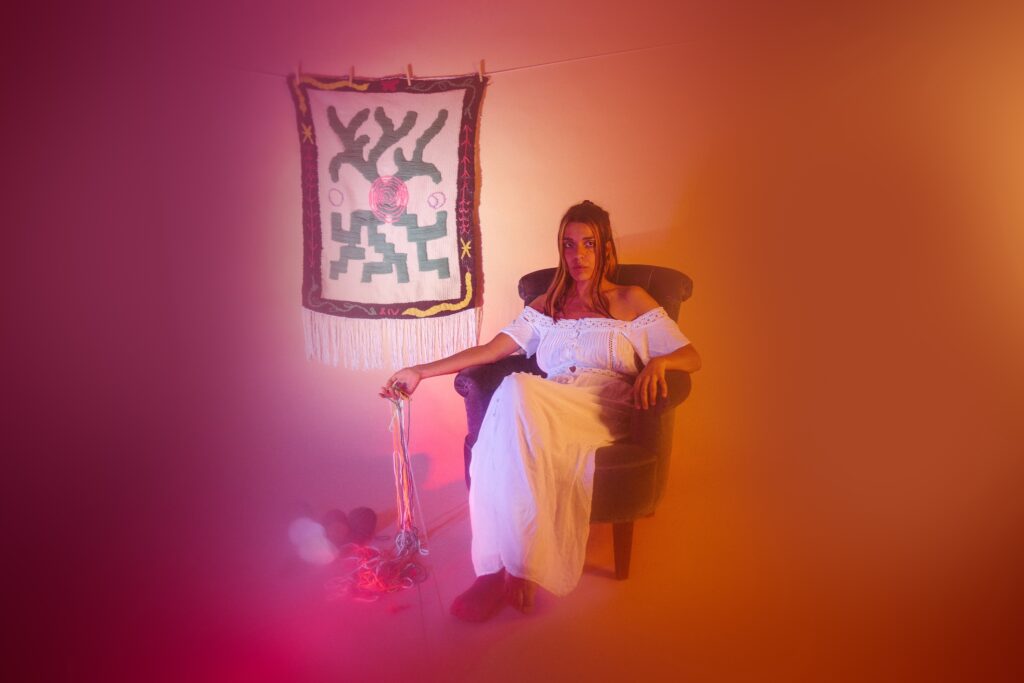North Portugal’s own Meta_ (Mariana) bridges the organic and the electronic, blending ancestral chants, field recordings, and poetic voice into transformative music. From her debut at Primavera Sound through festivals across Europe to Močvara! Dive into our interview and join us in the audience on August the 26th!
Can you say a couple of words about who you are and your work so far?
Sure! Hi, I am Mariana, a singer, songwriter and producer from North Portugal. I was born surrounded by the chants of my grandmothers and the symphony of nature in the rural landscape of my hometown. Since I was a little kid I have loved to sing and my passion for electronic music grew as I grew up.
The merging of the organic sounds with electronic, weaved with my poetry and voice, is what I love to do. A merging of different realities, a bridge between times and mediums, to unite the apparent opposites and create a sonic meeting point of all the journeys I have experienced.
I released my debut album “XIV-A Integração” in May 2023 by the Argentinian label ShikaShika and premiered the live show in PrimaveraSound Porto in the same year. In 2019 I was invited to play in Festival da Canção (Portuguese Eurovision Song Contest) in which I was a finalist with my original song and performance. Since then I have been playing festivals like Bons Sons (PT), Nos Alive (PT), Rio Loco (FR), Urkult (SE), Mumi (ES), Waves Vienna (AUT).
I also have been working as a Sound Designer for Theatre Plays for over 5 years, as well as working with communities around rural Portugal, focusing on elders and children, to amplify their voice through music as well as capturing field recordings.
With other musical projects beyond “Meta_”, I collaborate and play live with Dj and Producer Xinobi, with whom I have recorded for ArteConcert and played in Festivals like MeoKalorama (PT), Nos Alive (PT), EuropaVox (FR), Soundscape (TR) and we will be playing now in Festival Paredes de Coura (PT).
As a more meditative project, me and my big friend Bom Beijo created “Vibrasutra”, a soundjourney project where we just played in the Boom Festival.
This concert I will be doing is part of my Europe Tour, funded by Fundação GDA, with which I have also been able to do 2 concerts in Iceland beforehand.
You often bring nature, ancestry, and transformation into your music. How do your roots in Trás-os-Montes still shape the way you create and sound today?
Growing up surrounded by silence, nature and the slow practices of everyday life aligned with the cycles of nature is something now I deeply value and can see how it has impacted me in every area. It’s important for me to acknowledge my upbringing and where I come from so that I can create a future that is conscious of its roots. This connection with the Earth and its cycles is something that I want for people to feel when they listen to my music, whether it’s through the way I sing or through the instrumental creations.
On the musical production aspect, I always incorporate field recordings I do from the places that I get to be or to sample my recordings as a way to add texture and organic movement to the songs. I have also written songs like “Peneir-ar”- which is a metaphor of the sifting practice parallelled to the letting go we sometimes have to do in our lives- in which I sampled the sounds of the sift in my village and I wrote the lyrics relating to it.
There is this book by the painter Joan Miró called “I work like a gardener” and I find that I relate a lot to it. He explains that to make his art he treats it with the timings of a gardener, respecting the time of the seed, the time of the bloom and the time of the shedding. That everything has its natural rhythm and that’s a philosophy I try to attune myself, in music and in life.
To be aware of the land, the natural metamorphosis that keeps happening, the ancestors that have paved the path for us, it’s my job as a lover of the earth to keep these things alive and my way to do it is through music.
You use a lot of natural and ancestral sounds. Is there a sound — maybe from your childhood or your travels — that you keep coming back to when you create?
I wouldn’t say necessarily I go back to a sound to create. I definitely go back to memories, some of mine, some of the people around me. The translation of those images or feelings to sound is a big drive to create. But for sure, the sound of crickets takes me back home in a second.
Your music often flows between languages. Do certain emotions or ideas come more naturally in one language over another for you?
Exactly! I use different languages to express different emotions. I feel the phonetics of the language itself and the way I can share and write about it varies according to the language so I choose which one feels best for what I am trying to transmit. Sometimes, I love to mix different languages in the same song too. It’s also about blurring the boundaries of language and an invitation to hear beyond the lyrics.
If someone were hearing your music for the first time, is there a track you’d suggest they start with to really understand what Meta_ is all about — and why that one?
I would say “Fuego Sagrado”. I sing in 3 languages: Portuguese, Spanish and English and I wrote about the sacred fire that is used as alchemy to create liberation. It brings both the struggles of life and emotions we all go through but parallelled with metaphysical concepts, which I love.
Can you talk about one specific song from “XIV – A Integração” that carries deep personal meaning, and what listeners might not realize on first listen?
I think that would be my last song “Vento do Éter”. It’s an ambient composition I created all with field recordings and people I have recorded in my travels and daily life. My mom, dad, brother, grandmother and close friends are in the recording as well as Peruvian man that does boat trips on the Ucayali river in the Amazon Jungle or this Brazilian man playing the berimbau and me singing with him. In this one, I know a lot is my personal journey that will not be fully understood as It’s deeply personal but everyone can listen and compare it to their life and their journey, because that’s what’s really more important, your own experience of listening. I would just say to really pay attention to the lyrics in this one as there are some quite deep messages that have changed the way I see life.
Do you have any specific rituals or routines before going on stage?
My ritual is silence, prayer and gratitude. Take a deep breath, attune to myself and to why I am doing this and to be grateful that I can have the opportunity to share love and music with people.
Playing in a venue like Musicbox, which is linked to Liveurope and brings in artists from across Europe—did that spark anything new for you about collaboration or cultural exchange through music?
Having a space like Musicbox is so important for the cultural exchange here in Portugal and I have to mention that unfortunately that venue will be closing soon after 19 years. Portugal is yet to awaken and to truly value music, arts and culture as well as the underground scene. This venue has brought me many beautiful moments, inspiration and connection, not only when I have played there but when I have also been part of the audience. I hope we can see these places as meeting points for sharing and bridging communities and people with greater importance for society.
What have you been listening to lately? Do you know about any emerging names/colleagues we should check out?
Since I have just come back from the Iceland Tour, I have been listening to a lot of Icelandic Artists like Birnir, Briet, Venus Volcanism and of course, Bjork.
About emerging artists based in Portugal I would recommend you listen to Bia Maria, Bandua, and Bom Beijo.
Are there any venues or places where you would love to perform in the future?
Well, a dream come true is playing in Zagreb for the first time which I am so excited about! Regarding other venues and places, I would love to keep being able to play in international stages and venues around the world, while experiencing the culture and meeting people.
Thank you so much for this beautiful interview!
Anita Ulovec (Volontiram u Močvari)





























